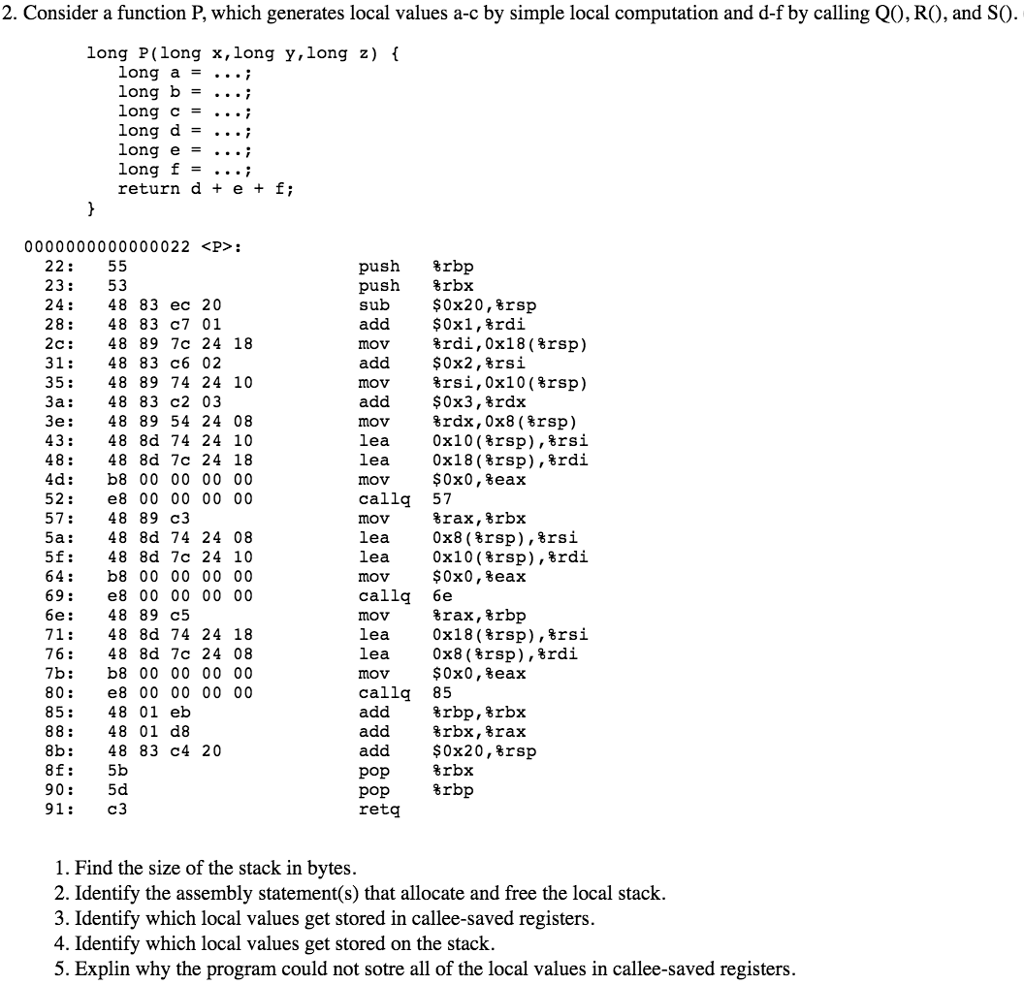Question
2. Consider a function P, which generates local values a-c by simple local computation and d-f by calling Q0, RO, and SO. long P(long x,long

22:55 23: 53 24: 48 83 ec 20 28:48 83 c7 01 2c: 48 89 7c 24 18 31: 48 83 c6 02 35 48 89 74 24 10 3a:48 83 c2 03 3e:48 89 54 24 08 43: 48 8d 74 24 10 48:48 8d 7c 24 18 4d:b8 00 00 00 00 52 e8 00 00 00 00 57:48 89 c3 5a:48 8d 74 24 08 5f: 48 8d 7c 24 10 64:b8 00 00 00 00 69 e8 00 00 00 00 6e:48 89 c5 71: 48 8d 74 24 18 76: 48 8d 7c 24 08 7b:b8 00 00 00 00 80 e8 00 00 00 00 85: 48 01 eb 88 48 01 d8 8b: 48 83 c4 20 8f:5b 90 5d 91: c3 push %rbp push %rbx sub add mov trdi , 0x18(%rsp) add $0x2 , %rsi mov trsi,0x10(%rsp) add0x3 mov trax , 0x8 ( %rsp) lea 0x10 (8rsp), rsi lea 0x18(%rsp),erdi mov callq 57 mov lea 0x8 ( %rsp ) ,%rsi lea 0x10(%rsp ) ,%rdi mov callq 6e mov lea 0x18(%rsp ) ,trsi lea 0x8 (8rsp),8rdi mov callq 85 add add add pop %rbp pop retq $0x20, %rsp $0x1,srdi , %rax $ 0x0 , %eax $ 0x0 , %eax trax, %rbp $0x0, %eax % rbp , % rbx $0x20, %rsp 1. Find the size of the stack in bytes 2. Identify the assembly statement(s) that allocate and free the local stack. 3. Identify which local values get stored in callee-saved registers 4. Identify which local values get stored on the stack. 5. Explin why the program could not sotre all of the local values in callee-saved registers. 2. Consider a function P, which generates local values a-c by simple local computation and d-f by calling Q0, RO, and SO. long P(long x,long y,long z) Long a ...i long b = long c -.... long d = long e -.... long f = return d+e + f; 0000000000000022
22:55 23: 53 24: 48 83 ec 20 28:48 83 c7 01 2c: 48 89 7c 24 18 31: 48 83 c6 02 35 48 89 74 24 10 3a:48 83 c2 03 3e:48 89 54 24 08 43: 48 8d 74 24 10 48:48 8d 7c 24 18 4d:b8 00 00 00 00 52 e8 00 00 00 00 57:48 89 c3 5a:48 8d 74 24 08 5f: 48 8d 7c 24 10 64:b8 00 00 00 00 69 e8 00 00 00 00 6e:48 89 c5 71: 48 8d 74 24 18 76: 48 8d 7c 24 08 7b:b8 00 00 00 00 80 e8 00 00 00 00 85: 48 01 eb 88 48 01 d8 8b: 48 83 c4 20 8f:5b 90 5d 91: c3 push %rbp push %rbx sub add mov trdi , 0x18(%rsp) add $0x2 , %rsi mov trsi,0x10(%rsp) add0x3 mov trax , 0x8 ( %rsp) lea 0x10 (8rsp), rsi lea 0x18(%rsp),erdi mov callq 57 mov lea 0x8 ( %rsp ) ,%rsi lea 0x10(%rsp ) ,%rdi mov callq 6e mov lea 0x18(%rsp ) ,trsi lea 0x8 (8rsp),8rdi mov callq 85 add add add pop %rbp pop retq $0x20, %rsp $0x1,srdi , %rax $ 0x0 , %eax $ 0x0 , %eax trax, %rbp $0x0, %eax % rbp , % rbx $0x20, %rsp 1. Find the size of the stack in bytes 2. Identify the assembly statement(s) that allocate and free the local stack. 3. Identify which local values get stored in callee-saved registers 4. Identify which local values get stored on the stack. 5. Explin why the program could not sotre all of the local values in callee-saved registers
Step by Step Solution
There are 3 Steps involved in it
Step: 1

Get Instant Access to Expert-Tailored Solutions
See step-by-step solutions with expert insights and AI powered tools for academic success
Step: 2

Step: 3

Ace Your Homework with AI
Get the answers you need in no time with our AI-driven, step-by-step assistance
Get Started


